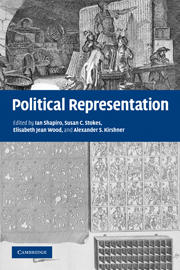Book contents
- Frontmatter
- Contents
- List of figures
- List of tables
- List of contributors
- Preface
- Editors' introduction
- Part I Representation before representative democracy
- Part II Theories of political representation
- Part III Representation and inherited injustice
- Part IV What role for representative quotas?
- Part V Preferences, persuasion, and democratic representation
- 10 Electoral representation and the aristocratic thesis
- 11 Why does the Republican Party win half the votes?
- 12 The impact of electoral debate on public opinions: an experimental investigation of the 2005 New York City mayoral election
- 13 Swing voters, core voters, and distributive politics
- Index
- References
11 - Why does the Republican Party win half the votes?
Published online by Cambridge University Press: 05 June 2012
- Frontmatter
- Contents
- List of figures
- List of tables
- List of contributors
- Preface
- Editors' introduction
- Part I Representation before representative democracy
- Part II Theories of political representation
- Part III Representation and inherited injustice
- Part IV What role for representative quotas?
- Part V Preferences, persuasion, and democratic representation
- 10 Electoral representation and the aristocratic thesis
- 11 Why does the Republican Party win half the votes?
- 12 The impact of electoral debate on public opinions: an experimental investigation of the 2005 New York City mayoral election
- 13 Swing voters, core voters, and distributive politics
- Index
- References
Summary
Introduction
How can a political party whose economic policies are in the interests of only a small fraction of the richest citizens maintain a sizable vote share in a democracy with full enfranchisement? The prime example of this puzzle today occurs in the United States. My aim in this chapter is to outline the possible answers to the question and then to present in some detail a study of one of the possibilities. I cannot claim, however, to know the answer.
One might, first of all, challenge my presumption that the economic policies advanced by the US Republican Party are indeed only in the interests of a small fraction of citizens at the top of the wealth distribution. Indeed, by the standards of one hundred years ago, the US has a progressive economic policy. About 31 percent of the national product is collected in taxes (at the federal, state, and local levels), and these taxes are used predominantly for transfer payments and expenditure on public goods. There is universal public education through age seventeen, and many states provide publicly financed tertiary education with modest private co-payments. Although the United States remains unique in the degree of private financing of its health services, nevertheless approximately 50 percent of health expenditures are public. There is a universal publicly financed pension system which is redistributive.
- Type
- Chapter
- Information
- Political Representation , pp. 304 - 323Publisher: Cambridge University PressPrint publication year: 2010



